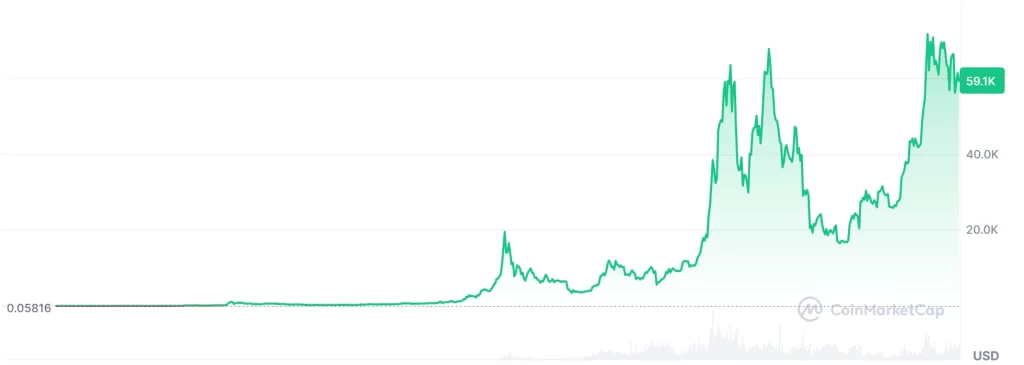
Check out Bitcoin prices this morning. They’re falling sharply, dipping below the $59,000 level in overnight trading.
The selloff is said to be sparked by a wave of leverage-driven liquidation. Bitcoin prices are in heavy consolidation, having dipped as much as 30% in the last few weeks. Despite this, Bitcoin is still up 38% year-to-date, indicating a bullish sentiment in the market. This shows that there is still significant capital on the sidelines, ready to invest in Bitcoin as a store of value.
We’ve seen some of the biggest sell-offs since the FTX collapse, including a major government selling off 100% of their Bitcoin, the long-looming Mt. Gox redistributions, and Japan’s yen carry trade, which has drained liquidity from all markets. Despite this, Bitcoin remains up 38% year-to-date, though the market is not out of the woods yet.
All selling was absorbed. Bitcoin price still up 38% YTD.
There are the reasons Bitcoin dipped this month:
- German Government Selling
- Mt Gox Redistributions
- US Govt Selling Silk Road Holdings
- Japan’s Yen Carry Trade
In other news, the SEC is now calling all NFTs securities. OpenSea, a leading NFT marketplace, has received a Wells notice from the SEC, with the company’s CEO, Devin Finzer, stating that the agency is threatening to sue, claiming that NFTs on OpenSea’s platform are securities. A Wells notice is a warning from the SEC that often precedes a lawsuit.

Meanwhile, Cardano’s founder, Charles Hoskinson, has been absent for days, leading to speculation just before the Changen hard fork. The hard fork upgrade, initially scheduled for this week, has been postponed to September 1st to allow exchanges, including Binance, to prepare.
A significant event in the crypto world involves Toncoin, the 10th largest cryptocurrency by market cap, linked to the messaging app Telegram. Toncoin lost more than $2.7 billion in value by Monday morning after Telegram’s CEO was detained in France over alleged child protection failures on the app.
The Ton blockchain is currently experiencing a disruption in block production due to an abnormal load, with several validators unable to clean the database of old transactions, leading to a loss of consensus. However, users are assured that their transactions will be completed, and no cryptocurrency assets will be lost due to the issue.
The current situation with Toncoin is reminiscent of the Tornado Cash case, where questions arose about whether developers or those who create a protocol should be held responsible for criminal activities conducted on the platform. It remains unclear if the Telegram CEO was aware of the alleged activities on the messaging app, or if he is being accused of facilitating these conversations.
Despite the network disruption, some industry voices argue that this is not the end of Toncoin. Telegram has options to remain active in the market, and while institutional investors may be hesitant, the ecosystem’s importance may prevent a complete collapse. Previous cases, such as the FTX case, have shown that information sharing on platforms like Telegram can have significant legal implications.

In a related development, the SEC issued a Wells notice to OpenSea, just one step before a lawsuit, claiming that NFTs are securities. This came a day after Donald Trump released a new series of Trump trading card NFTs on Bitcoin Ordinals. Trump has made it clear that if elected, he will fire Gary Gensler, the head of the SEC, who is currently pursuing aggressive action against NFTs and crypto platforms like Coinbase, Uniswap, Robinhood, Kraken, and ConsenSys.
This wave of regulatory actions follows a string of Wells notices received by web3 companies this year, including ConsenSys and Uniswap in April and Robinhood Crypto in May. Unlike OpenSea, these platforms do not primarily focus on NFTs, but the SEC has previously targeted specific NFT projects.
The crypto industry is rallying against the notion that all NFTs are securities. Coinbase CEO Brian Armstrong, after receiving a Wells notice, commented on the absurdity of regulating digital art in the same way as collateralized debt obligations.
The debate continues as to whether NFTs should be considered securities, with many arguing that if NFTs are securities, then so are items like Pokémon cards.
In the broader market, cheap capital could soon flood in, pushing investors out on the risk curve. While Wall Street views Bitcoin as a high-risk asset, the crypto industry considers it an asset to buy and hold, not to sell, keeping it illiquid. As we’ve seen in the past, when interest rates fall or cheap capital enters the market, Bitcoin has performed exceptionally well.